Marketing in Hospitality: Strategies, Analysis, and Implementation
VerifiedAdded on 2020/12/18
|19
|6429
|498
Report
AI Summary
This report delves into the core concepts of marketing within the hospitality industry, focusing on a case study of Holiday Inn. It explores the impact of the marketing environment, analyzing micro and macro factors such as customers, competitors, political, economic, social, technological, environmental, and legal influences (PESTEL analysis). The report examines consumer markets, detailing cultural, social, personal, and psychological factors influencing consumer behavior and decision-making processes. It further discusses the rationale for market segmentation, emphasizing its importance in tailoring services to diverse customer needs. The report then assesses the marketing mix components, analyzing pricing strategies and policies, and evaluating the implementation of a marketing plan. It also evaluates the role of the promotional mix, planning advertising campaigns, and examining the roles of sales promotion and public relations. Finally, the report addresses the relevance of market research and its practical application within the hospitality sector.
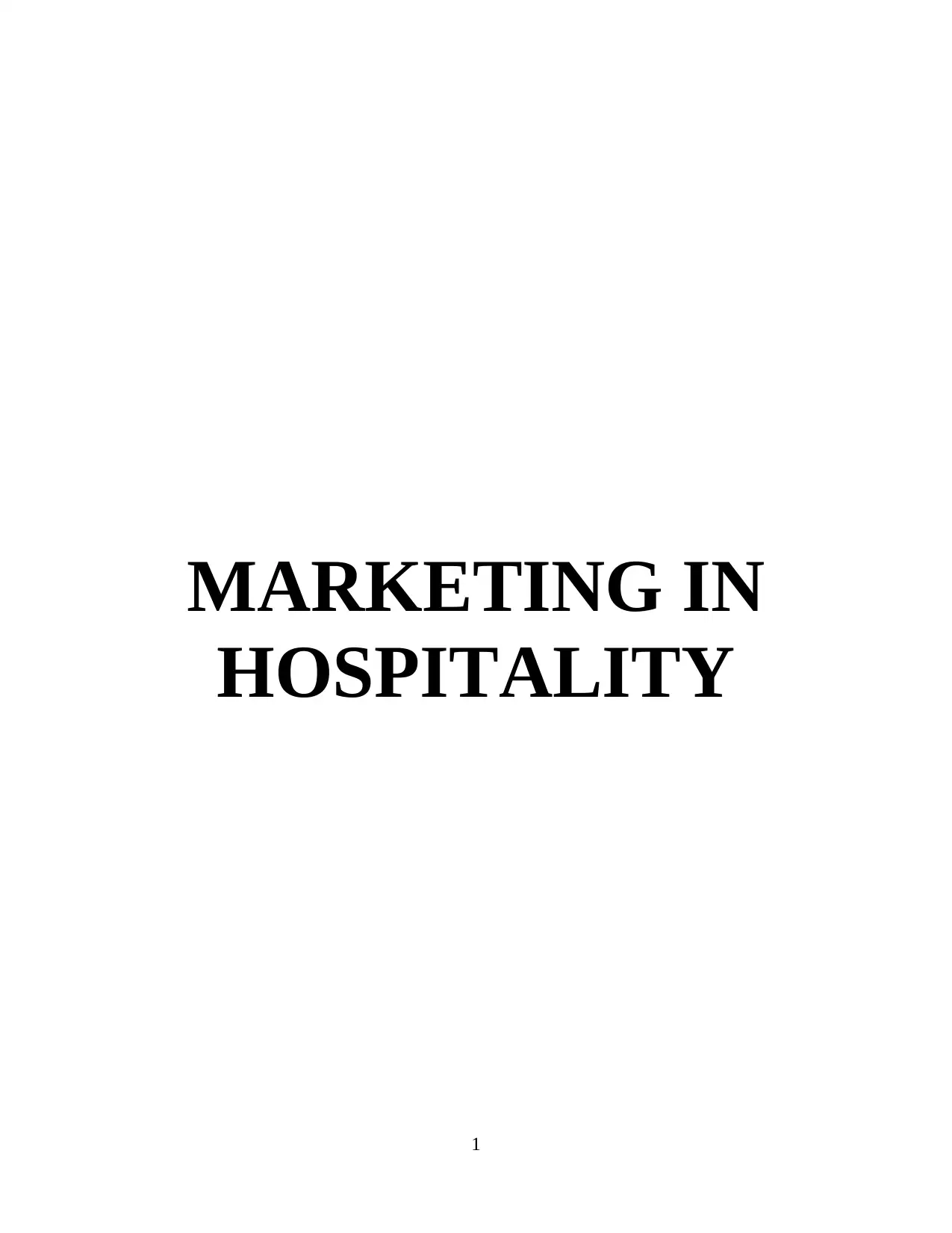
MARKETING IN
HOSPITALITY
1
HOSPITALITY
1
Paraphrase This Document
Need a fresh take? Get an instant paraphrase of this document with our AI Paraphraser
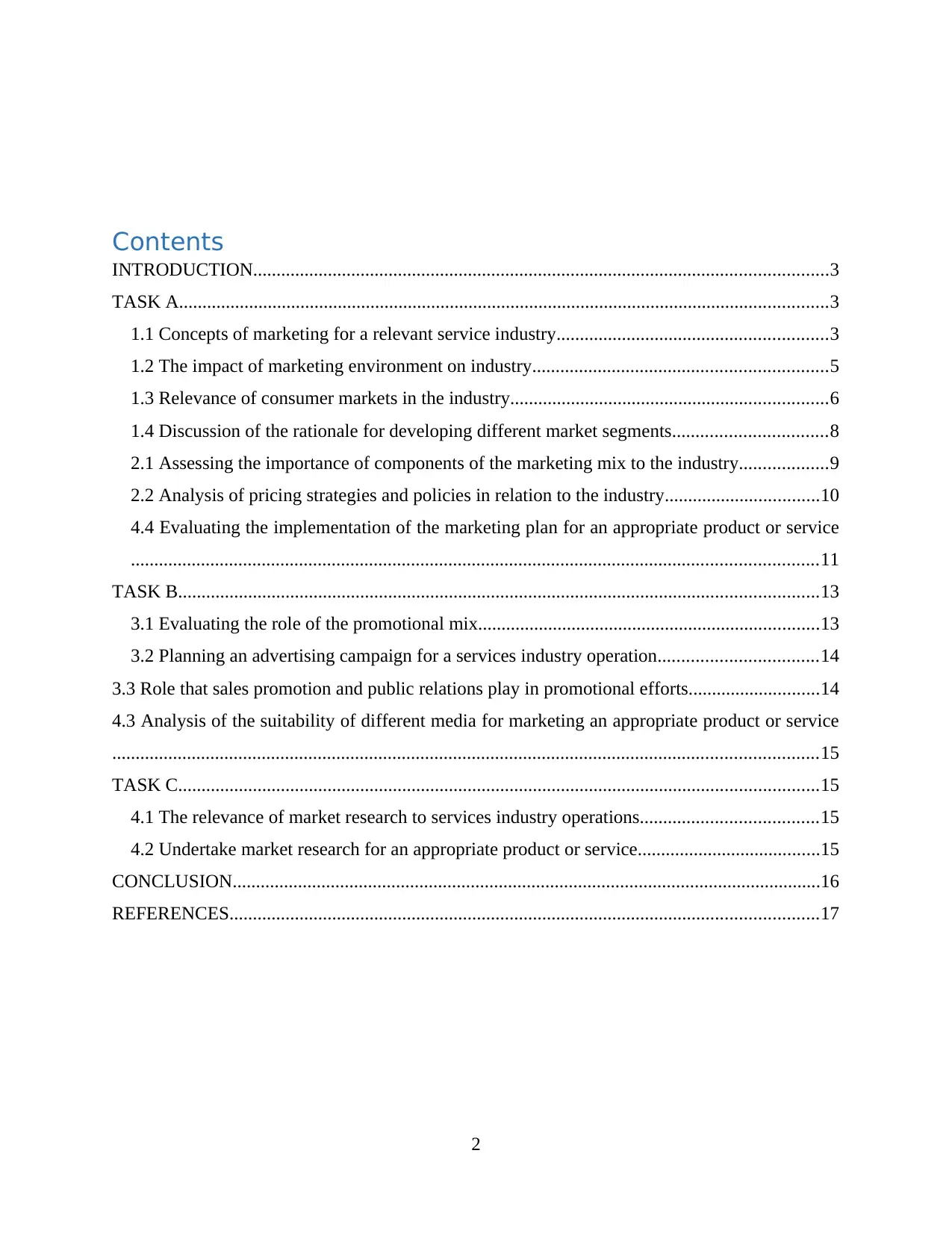
Contents
INTRODUCTION...........................................................................................................................3
TASK A...........................................................................................................................................3
1.1 Concepts of marketing for a relevant service industry..........................................................3
1.2 The impact of marketing environment on industry...............................................................5
1.3 Relevance of consumer markets in the industry....................................................................6
1.4 Discussion of the rationale for developing different market segments.................................8
2.1 Assessing the importance of components of the marketing mix to the industry...................9
2.2 Analysis of pricing strategies and policies in relation to the industry.................................10
4.4 Evaluating the implementation of the marketing plan for an appropriate product or service
...................................................................................................................................................11
TASK B.........................................................................................................................................13
3.1 Evaluating the role of the promotional mix.........................................................................13
3.2 Planning an advertising campaign for a services industry operation..................................14
3.3 Role that sales promotion and public relations play in promotional efforts............................14
4.3 Analysis of the suitability of different media for marketing an appropriate product or service
.......................................................................................................................................................15
TASK C.........................................................................................................................................15
4.1 The relevance of market research to services industry operations......................................15
4.2 Undertake market research for an appropriate product or service.......................................15
CONCLUSION..............................................................................................................................16
REFERENCES..............................................................................................................................17
2
INTRODUCTION...........................................................................................................................3
TASK A...........................................................................................................................................3
1.1 Concepts of marketing for a relevant service industry..........................................................3
1.2 The impact of marketing environment on industry...............................................................5
1.3 Relevance of consumer markets in the industry....................................................................6
1.4 Discussion of the rationale for developing different market segments.................................8
2.1 Assessing the importance of components of the marketing mix to the industry...................9
2.2 Analysis of pricing strategies and policies in relation to the industry.................................10
4.4 Evaluating the implementation of the marketing plan for an appropriate product or service
...................................................................................................................................................11
TASK B.........................................................................................................................................13
3.1 Evaluating the role of the promotional mix.........................................................................13
3.2 Planning an advertising campaign for a services industry operation..................................14
3.3 Role that sales promotion and public relations play in promotional efforts............................14
4.3 Analysis of the suitability of different media for marketing an appropriate product or service
.......................................................................................................................................................15
TASK C.........................................................................................................................................15
4.1 The relevance of market research to services industry operations......................................15
4.2 Undertake market research for an appropriate product or service.......................................15
CONCLUSION..............................................................................................................................16
REFERENCES..............................................................................................................................17
2
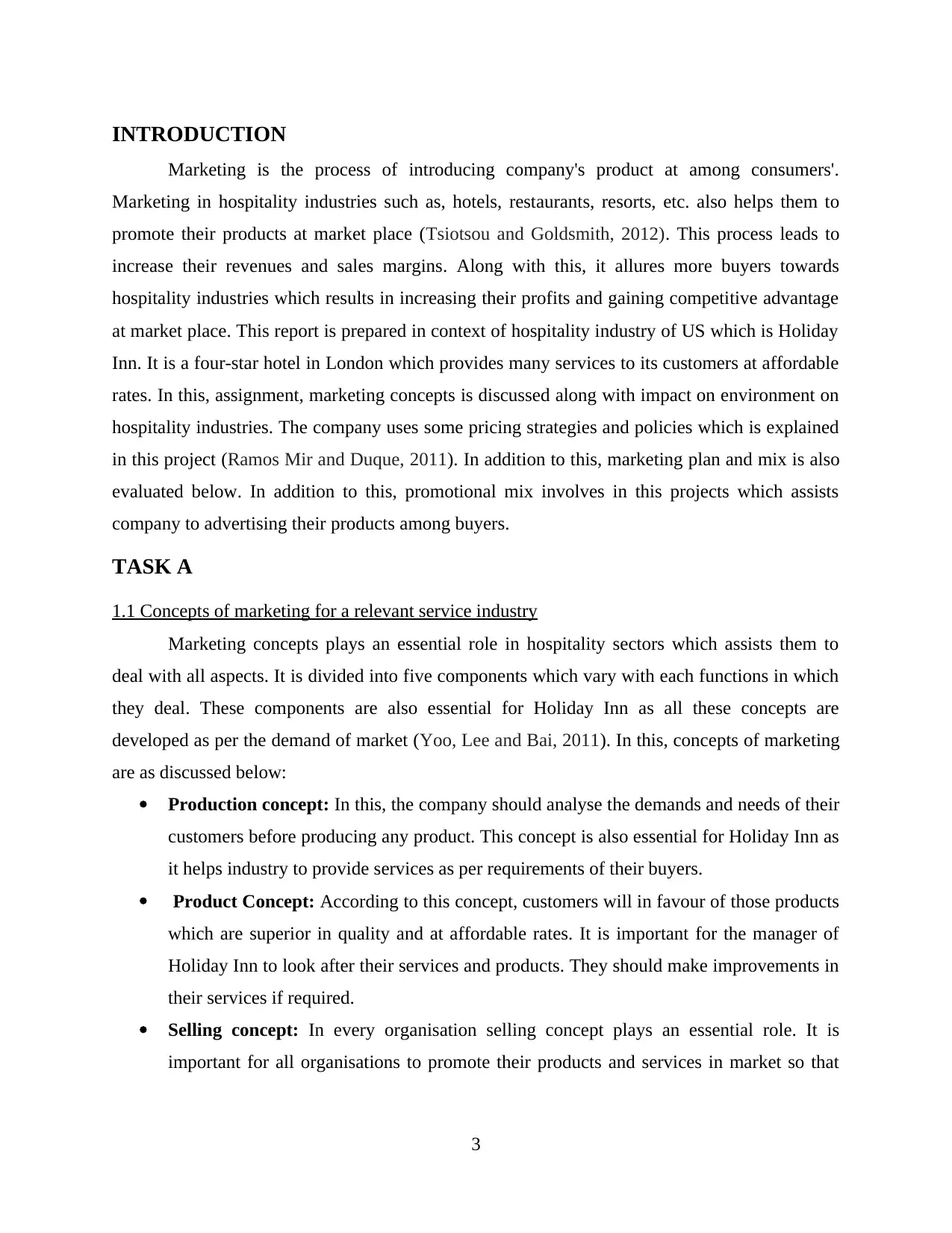
INTRODUCTION
Marketing is the process of introducing company's product at among consumers'.
Marketing in hospitality industries such as, hotels, restaurants, resorts, etc. also helps them to
promote their products at market place (Tsiotsou and Goldsmith, 2012). This process leads to
increase their revenues and sales margins. Along with this, it allures more buyers towards
hospitality industries which results in increasing their profits and gaining competitive advantage
at market place. This report is prepared in context of hospitality industry of US which is Holiday
Inn. It is a four-star hotel in London which provides many services to its customers at affordable
rates. In this, assignment, marketing concepts is discussed along with impact on environment on
hospitality industries. The company uses some pricing strategies and policies which is explained
in this project (Ramos Mir and Duque, 2011). In addition to this, marketing plan and mix is also
evaluated below. In addition to this, promotional mix involves in this projects which assists
company to advertising their products among buyers.
TASK A
1.1 Concepts of marketing for a relevant service industry
Marketing concepts plays an essential role in hospitality sectors which assists them to
deal with all aspects. It is divided into five components which vary with each functions in which
they deal. These components are also essential for Holiday Inn as all these concepts are
developed as per the demand of market (Yoo, Lee and Bai, 2011). In this, concepts of marketing
are as discussed below:
Production concept: In this, the company should analyse the demands and needs of their
customers before producing any product. This concept is also essential for Holiday Inn as
it helps industry to provide services as per requirements of their buyers.
Product Concept: According to this concept, customers will in favour of those products
which are superior in quality and at affordable rates. It is important for the manager of
Holiday Inn to look after their services and products. They should make improvements in
their services if required.
Selling concept: In every organisation selling concept plays an essential role. It is
important for all organisations to promote their products and services in market so that
3
Marketing is the process of introducing company's product at among consumers'.
Marketing in hospitality industries such as, hotels, restaurants, resorts, etc. also helps them to
promote their products at market place (Tsiotsou and Goldsmith, 2012). This process leads to
increase their revenues and sales margins. Along with this, it allures more buyers towards
hospitality industries which results in increasing their profits and gaining competitive advantage
at market place. This report is prepared in context of hospitality industry of US which is Holiday
Inn. It is a four-star hotel in London which provides many services to its customers at affordable
rates. In this, assignment, marketing concepts is discussed along with impact on environment on
hospitality industries. The company uses some pricing strategies and policies which is explained
in this project (Ramos Mir and Duque, 2011). In addition to this, marketing plan and mix is also
evaluated below. In addition to this, promotional mix involves in this projects which assists
company to advertising their products among buyers.
TASK A
1.1 Concepts of marketing for a relevant service industry
Marketing concepts plays an essential role in hospitality sectors which assists them to
deal with all aspects. It is divided into five components which vary with each functions in which
they deal. These components are also essential for Holiday Inn as all these concepts are
developed as per the demand of market (Yoo, Lee and Bai, 2011). In this, concepts of marketing
are as discussed below:
Production concept: In this, the company should analyse the demands and needs of their
customers before producing any product. This concept is also essential for Holiday Inn as
it helps industry to provide services as per requirements of their buyers.
Product Concept: According to this concept, customers will in favour of those products
which are superior in quality and at affordable rates. It is important for the manager of
Holiday Inn to look after their services and products. They should make improvements in
their services if required.
Selling concept: In every organisation selling concept plays an essential role. It is
important for all organisations to promote their products and services in market so that
3
⊘ This is a preview!⊘
Do you want full access?
Subscribe today to unlock all pages.

Trusted by 1+ million students worldwide
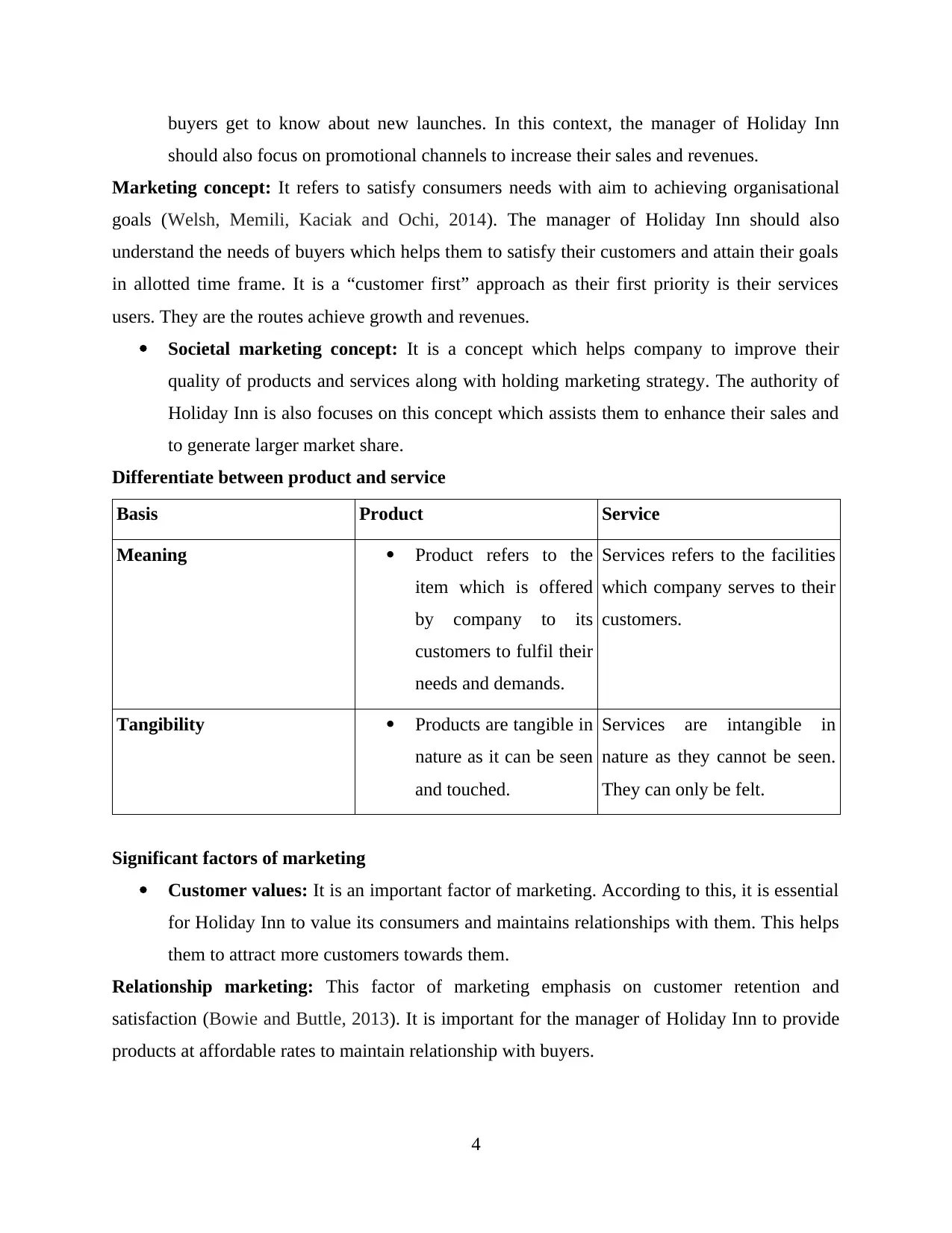
buyers get to know about new launches. In this context, the manager of Holiday Inn
should also focus on promotional channels to increase their sales and revenues.
Marketing concept: It refers to satisfy consumers needs with aim to achieving organisational
goals (Welsh, Memili, Kaciak and Ochi, 2014). The manager of Holiday Inn should also
understand the needs of buyers which helps them to satisfy their customers and attain their goals
in allotted time frame. It is a “customer first” approach as their first priority is their services
users. They are the routes achieve growth and revenues.
Societal marketing concept: It is a concept which helps company to improve their
quality of products and services along with holding marketing strategy. The authority of
Holiday Inn is also focuses on this concept which assists them to enhance their sales and
to generate larger market share.
Differentiate between product and service
Basis Product Service
Meaning Product refers to the
item which is offered
by company to its
customers to fulfil their
needs and demands.
Services refers to the facilities
which company serves to their
customers.
Tangibility Products are tangible in
nature as it can be seen
and touched.
Services are intangible in
nature as they cannot be seen.
They can only be felt.
Significant factors of marketing
Customer values: It is an important factor of marketing. According to this, it is essential
for Holiday Inn to value its consumers and maintains relationships with them. This helps
them to attract more customers towards them.
Relationship marketing: This factor of marketing emphasis on customer retention and
satisfaction (Bowie and Buttle, 2013). It is important for the manager of Holiday Inn to provide
products at affordable rates to maintain relationship with buyers.
4
should also focus on promotional channels to increase their sales and revenues.
Marketing concept: It refers to satisfy consumers needs with aim to achieving organisational
goals (Welsh, Memili, Kaciak and Ochi, 2014). The manager of Holiday Inn should also
understand the needs of buyers which helps them to satisfy their customers and attain their goals
in allotted time frame. It is a “customer first” approach as their first priority is their services
users. They are the routes achieve growth and revenues.
Societal marketing concept: It is a concept which helps company to improve their
quality of products and services along with holding marketing strategy. The authority of
Holiday Inn is also focuses on this concept which assists them to enhance their sales and
to generate larger market share.
Differentiate between product and service
Basis Product Service
Meaning Product refers to the
item which is offered
by company to its
customers to fulfil their
needs and demands.
Services refers to the facilities
which company serves to their
customers.
Tangibility Products are tangible in
nature as it can be seen
and touched.
Services are intangible in
nature as they cannot be seen.
They can only be felt.
Significant factors of marketing
Customer values: It is an important factor of marketing. According to this, it is essential
for Holiday Inn to value its consumers and maintains relationships with them. This helps
them to attract more customers towards them.
Relationship marketing: This factor of marketing emphasis on customer retention and
satisfaction (Bowie and Buttle, 2013). It is important for the manager of Holiday Inn to provide
products at affordable rates to maintain relationship with buyers.
4
Paraphrase This Document
Need a fresh take? Get an instant paraphrase of this document with our AI Paraphraser
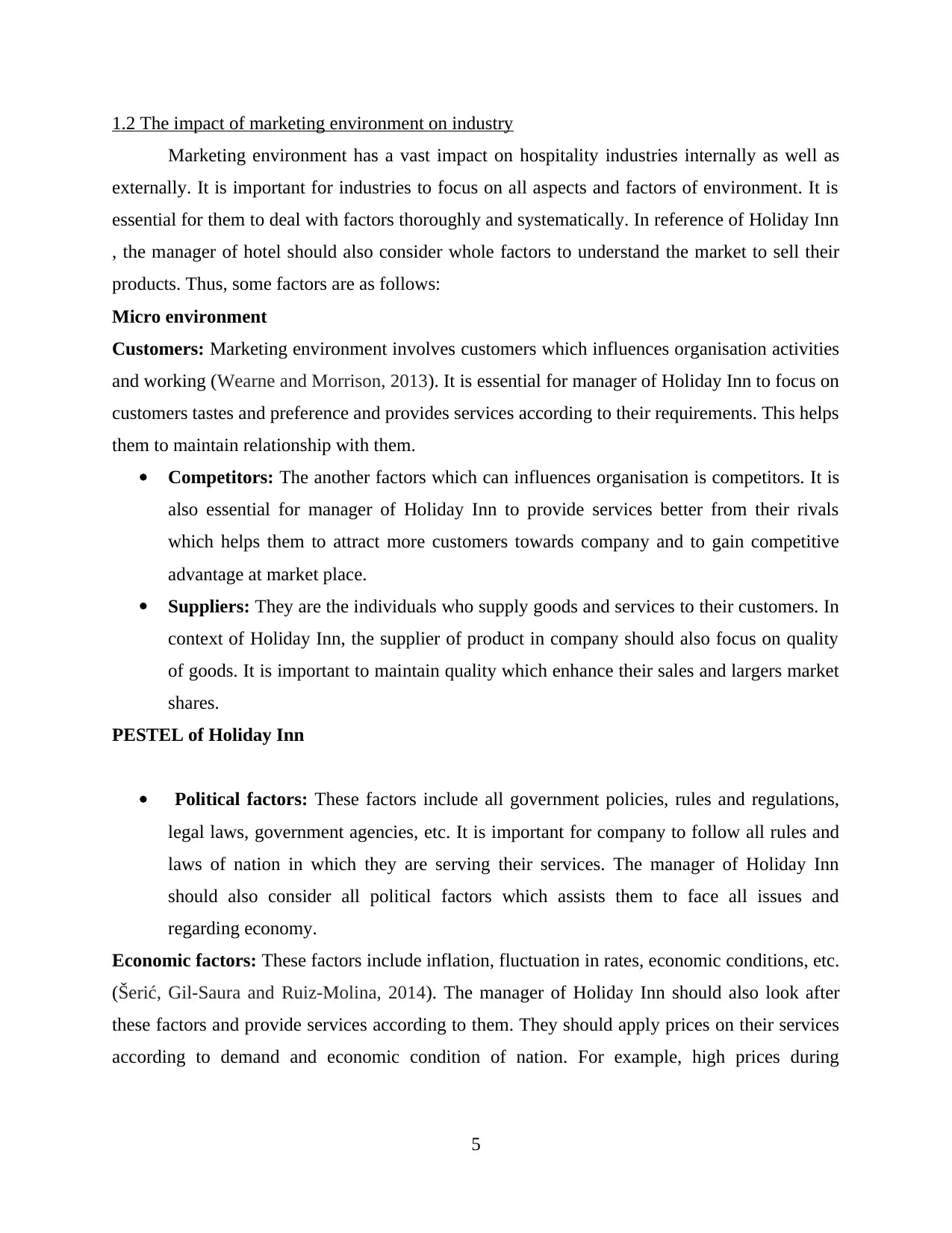
1.2 The impact of marketing environment on industry
Marketing environment has a vast impact on hospitality industries internally as well as
externally. It is important for industries to focus on all aspects and factors of environment. It is
essential for them to deal with factors thoroughly and systematically. In reference of Holiday Inn
, the manager of hotel should also consider whole factors to understand the market to sell their
products. Thus, some factors are as follows:
Micro environment
Customers: Marketing environment involves customers which influences organisation activities
and working (Wearne and Morrison, 2013). It is essential for manager of Holiday Inn to focus on
customers tastes and preference and provides services according to their requirements. This helps
them to maintain relationship with them.
Competitors: The another factors which can influences organisation is competitors. It is
also essential for manager of Holiday Inn to provide services better from their rivals
which helps them to attract more customers towards company and to gain competitive
advantage at market place.
Suppliers: They are the individuals who supply goods and services to their customers. In
context of Holiday Inn, the supplier of product in company should also focus on quality
of goods. It is important to maintain quality which enhance their sales and largers market
shares.
PESTEL of Holiday Inn
Political factors: These factors include all government policies, rules and regulations,
legal laws, government agencies, etc. It is important for company to follow all rules and
laws of nation in which they are serving their services. The manager of Holiday Inn
should also consider all political factors which assists them to face all issues and
regarding economy.
Economic factors: These factors include inflation, fluctuation in rates, economic conditions, etc.
(Šerić, Gil-Saura and Ruiz-Molina, 2014). The manager of Holiday Inn should also look after
these factors and provide services according to them. They should apply prices on their services
according to demand and economic condition of nation. For example, high prices during
5
Marketing environment has a vast impact on hospitality industries internally as well as
externally. It is important for industries to focus on all aspects and factors of environment. It is
essential for them to deal with factors thoroughly and systematically. In reference of Holiday Inn
, the manager of hotel should also consider whole factors to understand the market to sell their
products. Thus, some factors are as follows:
Micro environment
Customers: Marketing environment involves customers which influences organisation activities
and working (Wearne and Morrison, 2013). It is essential for manager of Holiday Inn to focus on
customers tastes and preference and provides services according to their requirements. This helps
them to maintain relationship with them.
Competitors: The another factors which can influences organisation is competitors. It is
also essential for manager of Holiday Inn to provide services better from their rivals
which helps them to attract more customers towards company and to gain competitive
advantage at market place.
Suppliers: They are the individuals who supply goods and services to their customers. In
context of Holiday Inn, the supplier of product in company should also focus on quality
of goods. It is important to maintain quality which enhance their sales and largers market
shares.
PESTEL of Holiday Inn
Political factors: These factors include all government policies, rules and regulations,
legal laws, government agencies, etc. It is important for company to follow all rules and
laws of nation in which they are serving their services. The manager of Holiday Inn
should also consider all political factors which assists them to face all issues and
regarding economy.
Economic factors: These factors include inflation, fluctuation in rates, economic conditions, etc.
(Šerić, Gil-Saura and Ruiz-Molina, 2014). The manager of Holiday Inn should also look after
these factors and provide services according to them. They should apply prices on their services
according to demand and economic condition of nation. For example, high prices during
5
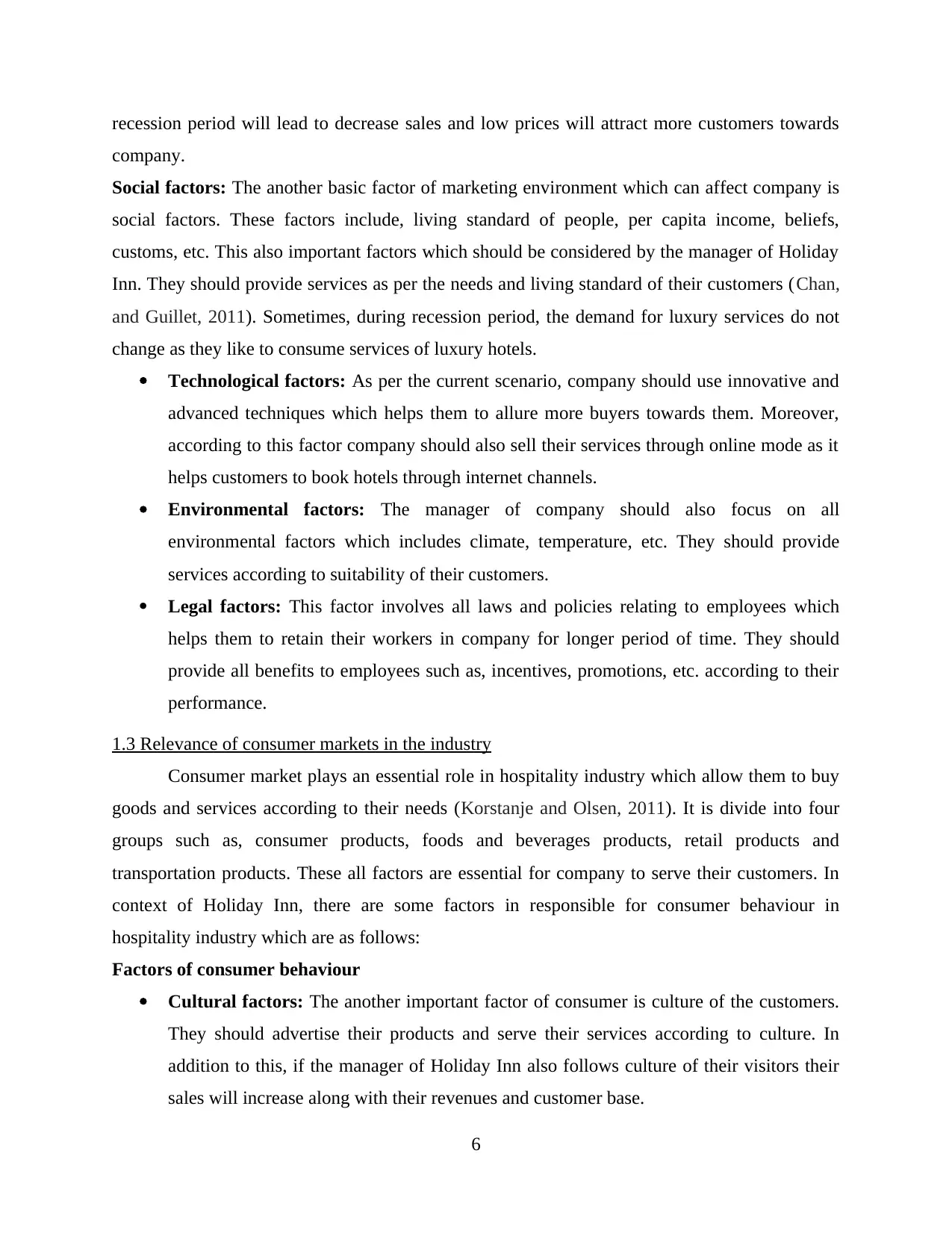
recession period will lead to decrease sales and low prices will attract more customers towards
company.
Social factors: The another basic factor of marketing environment which can affect company is
social factors. These factors include, living standard of people, per capita income, beliefs,
customs, etc. This also important factors which should be considered by the manager of Holiday
Inn. They should provide services as per the needs and living standard of their customers (Chan,
and Guillet, 2011). Sometimes, during recession period, the demand for luxury services do not
change as they like to consume services of luxury hotels.
Technological factors: As per the current scenario, company should use innovative and
advanced techniques which helps them to allure more buyers towards them. Moreover,
according to this factor company should also sell their services through online mode as it
helps customers to book hotels through internet channels.
Environmental factors: The manager of company should also focus on all
environmental factors which includes climate, temperature, etc. They should provide
services according to suitability of their customers.
Legal factors: This factor involves all laws and policies relating to employees which
helps them to retain their workers in company for longer period of time. They should
provide all benefits to employees such as, incentives, promotions, etc. according to their
performance.
1.3 Relevance of consumer markets in the industry
Consumer market plays an essential role in hospitality industry which allow them to buy
goods and services according to their needs (Korstanje and Olsen, 2011). It is divide into four
groups such as, consumer products, foods and beverages products, retail products and
transportation products. These all factors are essential for company to serve their customers. In
context of Holiday Inn, there are some factors in responsible for consumer behaviour in
hospitality industry which are as follows:
Factors of consumer behaviour
Cultural factors: The another important factor of consumer is culture of the customers.
They should advertise their products and serve their services according to culture. In
addition to this, if the manager of Holiday Inn also follows culture of their visitors their
sales will increase along with their revenues and customer base.
6
company.
Social factors: The another basic factor of marketing environment which can affect company is
social factors. These factors include, living standard of people, per capita income, beliefs,
customs, etc. This also important factors which should be considered by the manager of Holiday
Inn. They should provide services as per the needs and living standard of their customers (Chan,
and Guillet, 2011). Sometimes, during recession period, the demand for luxury services do not
change as they like to consume services of luxury hotels.
Technological factors: As per the current scenario, company should use innovative and
advanced techniques which helps them to allure more buyers towards them. Moreover,
according to this factor company should also sell their services through online mode as it
helps customers to book hotels through internet channels.
Environmental factors: The manager of company should also focus on all
environmental factors which includes climate, temperature, etc. They should provide
services according to suitability of their customers.
Legal factors: This factor involves all laws and policies relating to employees which
helps them to retain their workers in company for longer period of time. They should
provide all benefits to employees such as, incentives, promotions, etc. according to their
performance.
1.3 Relevance of consumer markets in the industry
Consumer market plays an essential role in hospitality industry which allow them to buy
goods and services according to their needs (Korstanje and Olsen, 2011). It is divide into four
groups such as, consumer products, foods and beverages products, retail products and
transportation products. These all factors are essential for company to serve their customers. In
context of Holiday Inn, there are some factors in responsible for consumer behaviour in
hospitality industry which are as follows:
Factors of consumer behaviour
Cultural factors: The another important factor of consumer is culture of the customers.
They should advertise their products and serve their services according to culture. In
addition to this, if the manager of Holiday Inn also follows culture of their visitors their
sales will increase along with their revenues and customer base.
6
⊘ This is a preview!⊘
Do you want full access?
Subscribe today to unlock all pages.

Trusted by 1+ million students worldwide
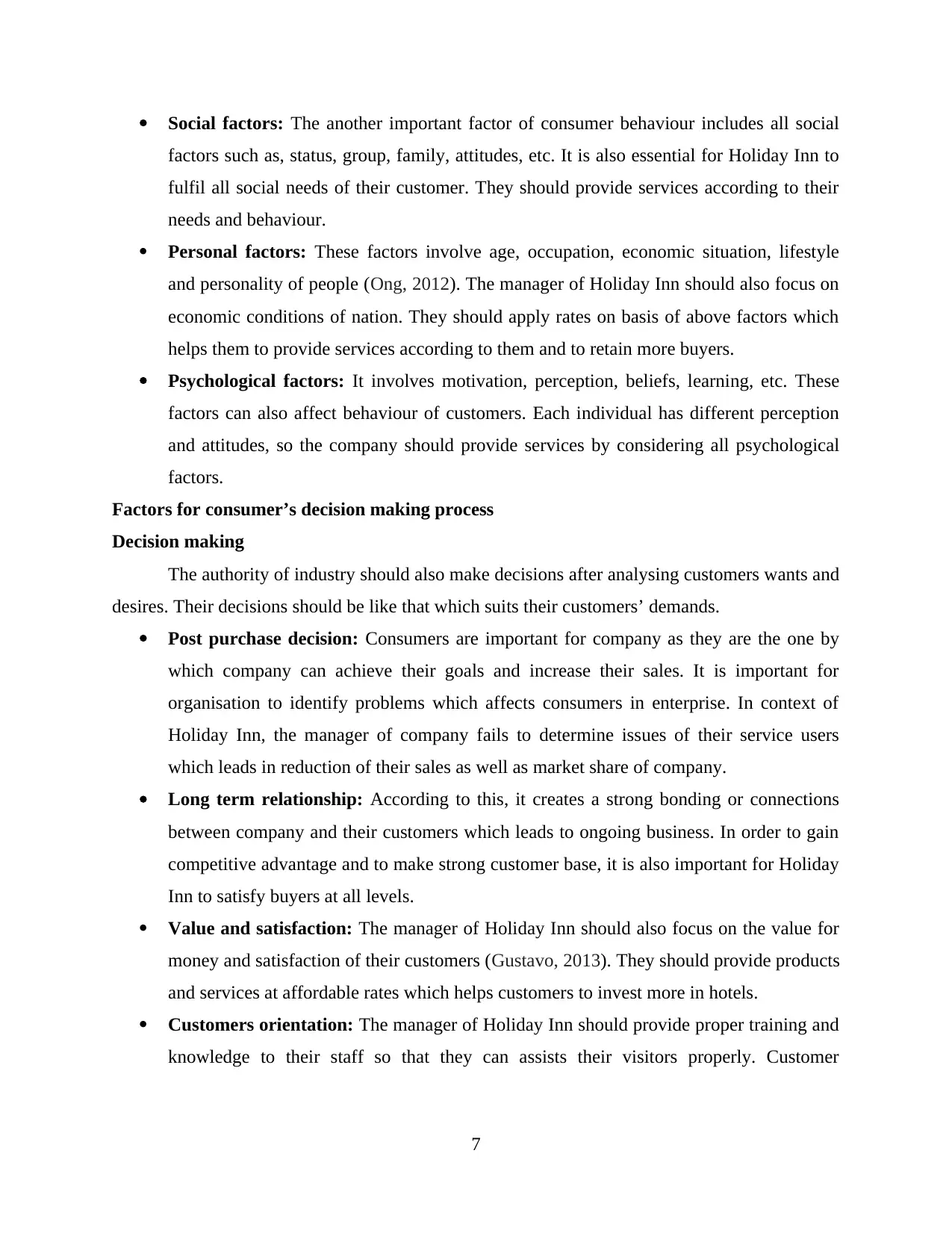
Social factors: The another important factor of consumer behaviour includes all social
factors such as, status, group, family, attitudes, etc. It is also essential for Holiday Inn to
fulfil all social needs of their customer. They should provide services according to their
needs and behaviour.
Personal factors: These factors involve age, occupation, economic situation, lifestyle
and personality of people (Ong, 2012). The manager of Holiday Inn should also focus on
economic conditions of nation. They should apply rates on basis of above factors which
helps them to provide services according to them and to retain more buyers.
Psychological factors: It involves motivation, perception, beliefs, learning, etc. These
factors can also affect behaviour of customers. Each individual has different perception
and attitudes, so the company should provide services by considering all psychological
factors.
Factors for consumer’s decision making process
Decision making
The authority of industry should also make decisions after analysing customers wants and
desires. Their decisions should be like that which suits their customers’ demands.
Post purchase decision: Consumers are important for company as they are the one by
which company can achieve their goals and increase their sales. It is important for
organisation to identify problems which affects consumers in enterprise. In context of
Holiday Inn, the manager of company fails to determine issues of their service users
which leads in reduction of their sales as well as market share of company.
Long term relationship: According to this, it creates a strong bonding or connections
between company and their customers which leads to ongoing business. In order to gain
competitive advantage and to make strong customer base, it is also important for Holiday
Inn to satisfy buyers at all levels.
Value and satisfaction: The manager of Holiday Inn should also focus on the value for
money and satisfaction of their customers (Gustavo, 2013). They should provide products
and services at affordable rates which helps customers to invest more in hotels.
Customers orientation: The manager of Holiday Inn should provide proper training and
knowledge to their staff so that they can assists their visitors properly. Customer
7
factors such as, status, group, family, attitudes, etc. It is also essential for Holiday Inn to
fulfil all social needs of their customer. They should provide services according to their
needs and behaviour.
Personal factors: These factors involve age, occupation, economic situation, lifestyle
and personality of people (Ong, 2012). The manager of Holiday Inn should also focus on
economic conditions of nation. They should apply rates on basis of above factors which
helps them to provide services according to them and to retain more buyers.
Psychological factors: It involves motivation, perception, beliefs, learning, etc. These
factors can also affect behaviour of customers. Each individual has different perception
and attitudes, so the company should provide services by considering all psychological
factors.
Factors for consumer’s decision making process
Decision making
The authority of industry should also make decisions after analysing customers wants and
desires. Their decisions should be like that which suits their customers’ demands.
Post purchase decision: Consumers are important for company as they are the one by
which company can achieve their goals and increase their sales. It is important for
organisation to identify problems which affects consumers in enterprise. In context of
Holiday Inn, the manager of company fails to determine issues of their service users
which leads in reduction of their sales as well as market share of company.
Long term relationship: According to this, it creates a strong bonding or connections
between company and their customers which leads to ongoing business. In order to gain
competitive advantage and to make strong customer base, it is also important for Holiday
Inn to satisfy buyers at all levels.
Value and satisfaction: The manager of Holiday Inn should also focus on the value for
money and satisfaction of their customers (Gustavo, 2013). They should provide products
and services at affordable rates which helps customers to invest more in hotels.
Customers orientation: The manager of Holiday Inn should provide proper training and
knowledge to their staff so that they can assists their visitors properly. Customer
7
Paraphrase This Document
Need a fresh take? Get an instant paraphrase of this document with our AI Paraphraser
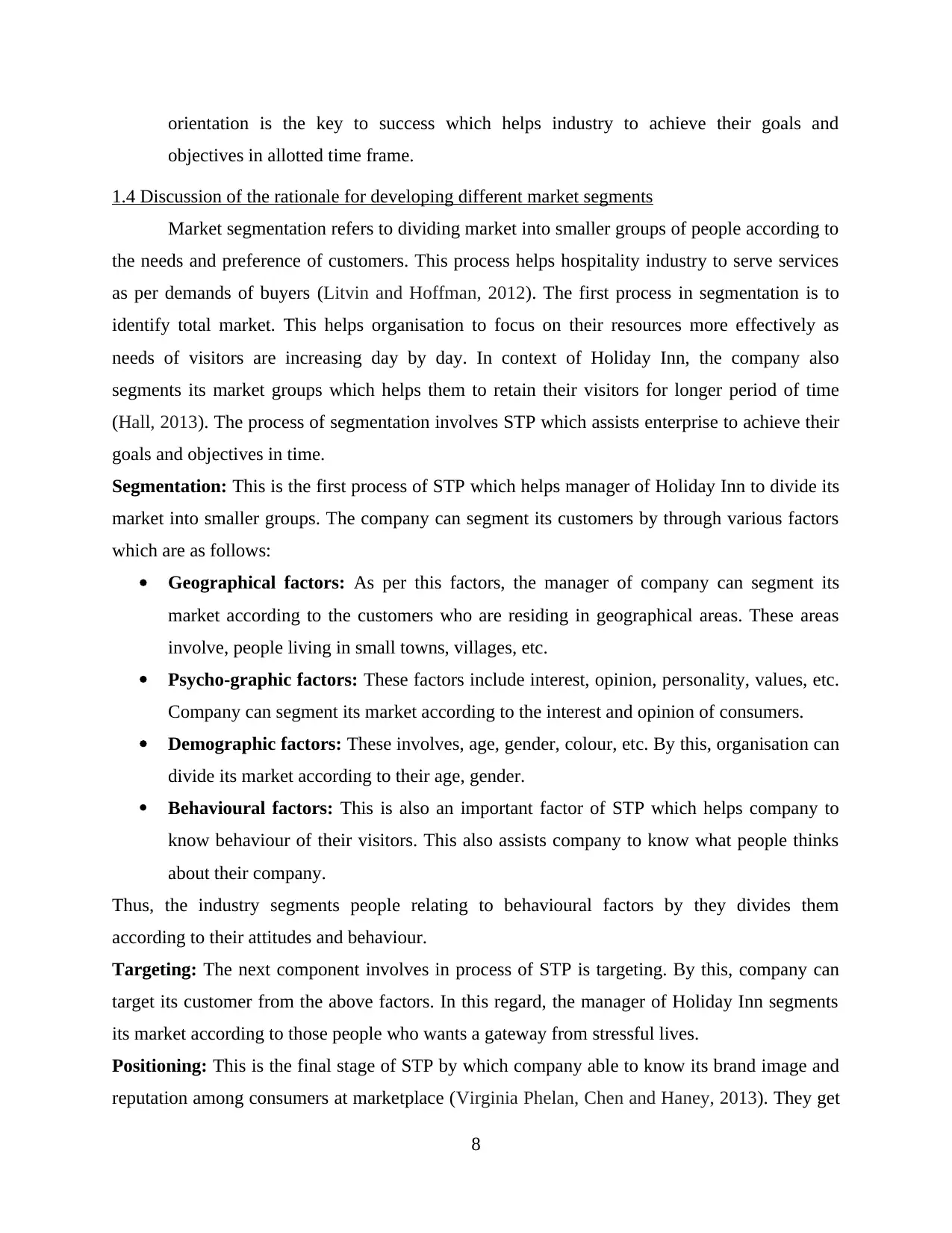
orientation is the key to success which helps industry to achieve their goals and
objectives in allotted time frame.
1.4 Discussion of the rationale for developing different market segments
Market segmentation refers to dividing market into smaller groups of people according to
the needs and preference of customers. This process helps hospitality industry to serve services
as per demands of buyers (Litvin and Hoffman, 2012). The first process in segmentation is to
identify total market. This helps organisation to focus on their resources more effectively as
needs of visitors are increasing day by day. In context of Holiday Inn, the company also
segments its market groups which helps them to retain their visitors for longer period of time
(Hall, 2013). The process of segmentation involves STP which assists enterprise to achieve their
goals and objectives in time.
Segmentation: This is the first process of STP which helps manager of Holiday Inn to divide its
market into smaller groups. The company can segment its customers by through various factors
which are as follows:
Geographical factors: As per this factors, the manager of company can segment its
market according to the customers who are residing in geographical areas. These areas
involve, people living in small towns, villages, etc.
Psycho-graphic factors: These factors include interest, opinion, personality, values, etc.
Company can segment its market according to the interest and opinion of consumers.
Demographic factors: These involves, age, gender, colour, etc. By this, organisation can
divide its market according to their age, gender.
Behavioural factors: This is also an important factor of STP which helps company to
know behaviour of their visitors. This also assists company to know what people thinks
about their company.
Thus, the industry segments people relating to behavioural factors by they divides them
according to their attitudes and behaviour.
Targeting: The next component involves in process of STP is targeting. By this, company can
target its customer from the above factors. In this regard, the manager of Holiday Inn segments
its market according to those people who wants a gateway from stressful lives.
Positioning: This is the final stage of STP by which company able to know its brand image and
reputation among consumers at marketplace (Virginia Phelan, Chen and Haney, 2013). They get
8
objectives in allotted time frame.
1.4 Discussion of the rationale for developing different market segments
Market segmentation refers to dividing market into smaller groups of people according to
the needs and preference of customers. This process helps hospitality industry to serve services
as per demands of buyers (Litvin and Hoffman, 2012). The first process in segmentation is to
identify total market. This helps organisation to focus on their resources more effectively as
needs of visitors are increasing day by day. In context of Holiday Inn, the company also
segments its market groups which helps them to retain their visitors for longer period of time
(Hall, 2013). The process of segmentation involves STP which assists enterprise to achieve their
goals and objectives in time.
Segmentation: This is the first process of STP which helps manager of Holiday Inn to divide its
market into smaller groups. The company can segment its customers by through various factors
which are as follows:
Geographical factors: As per this factors, the manager of company can segment its
market according to the customers who are residing in geographical areas. These areas
involve, people living in small towns, villages, etc.
Psycho-graphic factors: These factors include interest, opinion, personality, values, etc.
Company can segment its market according to the interest and opinion of consumers.
Demographic factors: These involves, age, gender, colour, etc. By this, organisation can
divide its market according to their age, gender.
Behavioural factors: This is also an important factor of STP which helps company to
know behaviour of their visitors. This also assists company to know what people thinks
about their company.
Thus, the industry segments people relating to behavioural factors by they divides them
according to their attitudes and behaviour.
Targeting: The next component involves in process of STP is targeting. By this, company can
target its customer from the above factors. In this regard, the manager of Holiday Inn segments
its market according to those people who wants a gateway from stressful lives.
Positioning: This is the final stage of STP by which company able to know its brand image and
reputation among consumers at marketplace (Virginia Phelan, Chen and Haney, 2013). They get
8
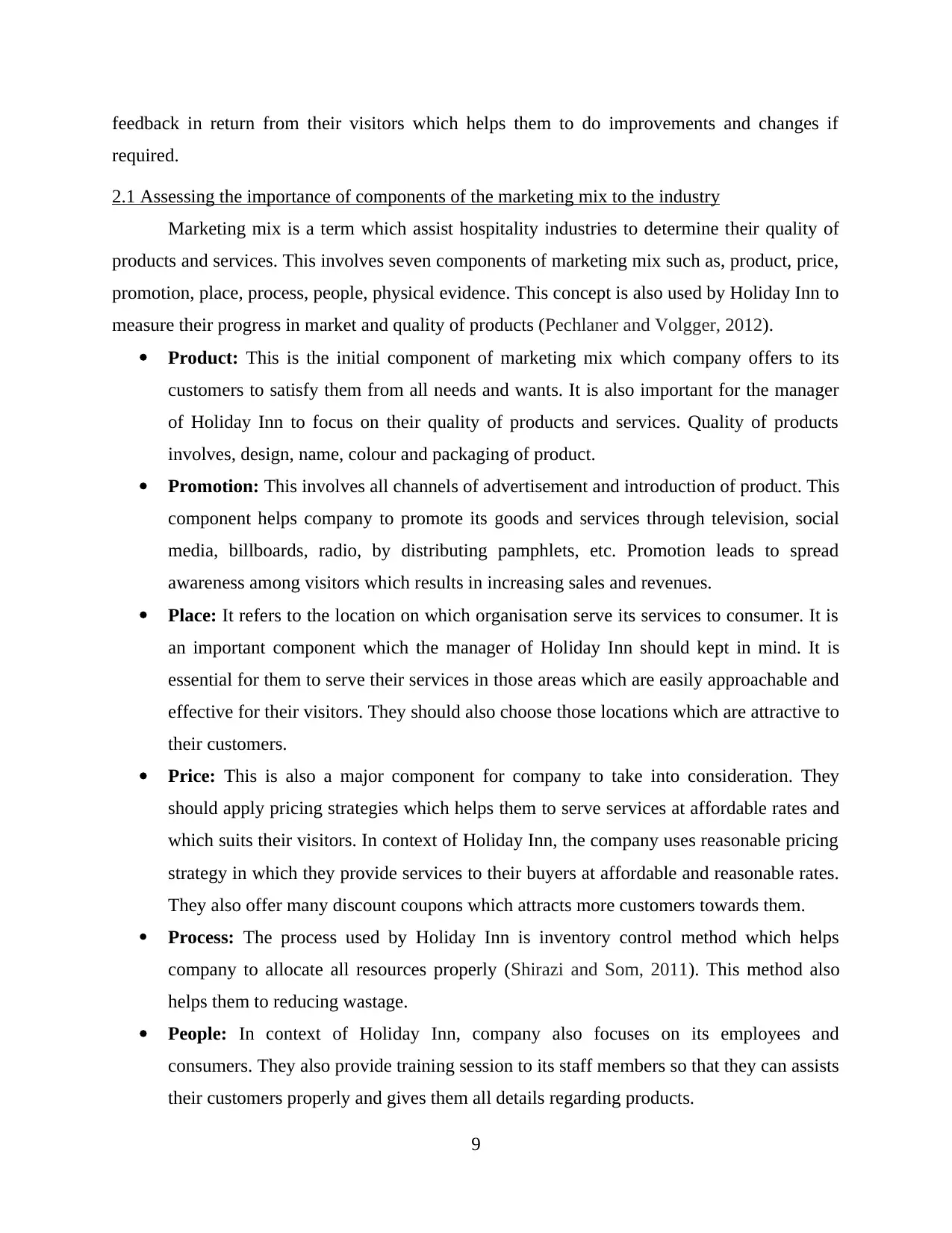
feedback in return from their visitors which helps them to do improvements and changes if
required.
2.1 Assessing the importance of components of the marketing mix to the industry
Marketing mix is a term which assist hospitality industries to determine their quality of
products and services. This involves seven components of marketing mix such as, product, price,
promotion, place, process, people, physical evidence. This concept is also used by Holiday Inn to
measure their progress in market and quality of products (Pechlaner and Volgger, 2012).
Product: This is the initial component of marketing mix which company offers to its
customers to satisfy them from all needs and wants. It is also important for the manager
of Holiday Inn to focus on their quality of products and services. Quality of products
involves, design, name, colour and packaging of product.
Promotion: This involves all channels of advertisement and introduction of product. This
component helps company to promote its goods and services through television, social
media, billboards, radio, by distributing pamphlets, etc. Promotion leads to spread
awareness among visitors which results in increasing sales and revenues.
Place: It refers to the location on which organisation serve its services to consumer. It is
an important component which the manager of Holiday Inn should kept in mind. It is
essential for them to serve their services in those areas which are easily approachable and
effective for their visitors. They should also choose those locations which are attractive to
their customers.
Price: This is also a major component for company to take into consideration. They
should apply pricing strategies which helps them to serve services at affordable rates and
which suits their visitors. In context of Holiday Inn, the company uses reasonable pricing
strategy in which they provide services to their buyers at affordable and reasonable rates.
They also offer many discount coupons which attracts more customers towards them.
Process: The process used by Holiday Inn is inventory control method which helps
company to allocate all resources properly (Shirazi and Som, 2011). This method also
helps them to reducing wastage.
People: In context of Holiday Inn, company also focuses on its employees and
consumers. They also provide training session to its staff members so that they can assists
their customers properly and gives them all details regarding products.
9
required.
2.1 Assessing the importance of components of the marketing mix to the industry
Marketing mix is a term which assist hospitality industries to determine their quality of
products and services. This involves seven components of marketing mix such as, product, price,
promotion, place, process, people, physical evidence. This concept is also used by Holiday Inn to
measure their progress in market and quality of products (Pechlaner and Volgger, 2012).
Product: This is the initial component of marketing mix which company offers to its
customers to satisfy them from all needs and wants. It is also important for the manager
of Holiday Inn to focus on their quality of products and services. Quality of products
involves, design, name, colour and packaging of product.
Promotion: This involves all channels of advertisement and introduction of product. This
component helps company to promote its goods and services through television, social
media, billboards, radio, by distributing pamphlets, etc. Promotion leads to spread
awareness among visitors which results in increasing sales and revenues.
Place: It refers to the location on which organisation serve its services to consumer. It is
an important component which the manager of Holiday Inn should kept in mind. It is
essential for them to serve their services in those areas which are easily approachable and
effective for their visitors. They should also choose those locations which are attractive to
their customers.
Price: This is also a major component for company to take into consideration. They
should apply pricing strategies which helps them to serve services at affordable rates and
which suits their visitors. In context of Holiday Inn, the company uses reasonable pricing
strategy in which they provide services to their buyers at affordable and reasonable rates.
They also offer many discount coupons which attracts more customers towards them.
Process: The process used by Holiday Inn is inventory control method which helps
company to allocate all resources properly (Shirazi and Som, 2011). This method also
helps them to reducing wastage.
People: In context of Holiday Inn, company also focuses on its employees and
consumers. They also provide training session to its staff members so that they can assists
their customers properly and gives them all details regarding products.
9
⊘ This is a preview!⊘
Do you want full access?
Subscribe today to unlock all pages.

Trusted by 1+ million students worldwide
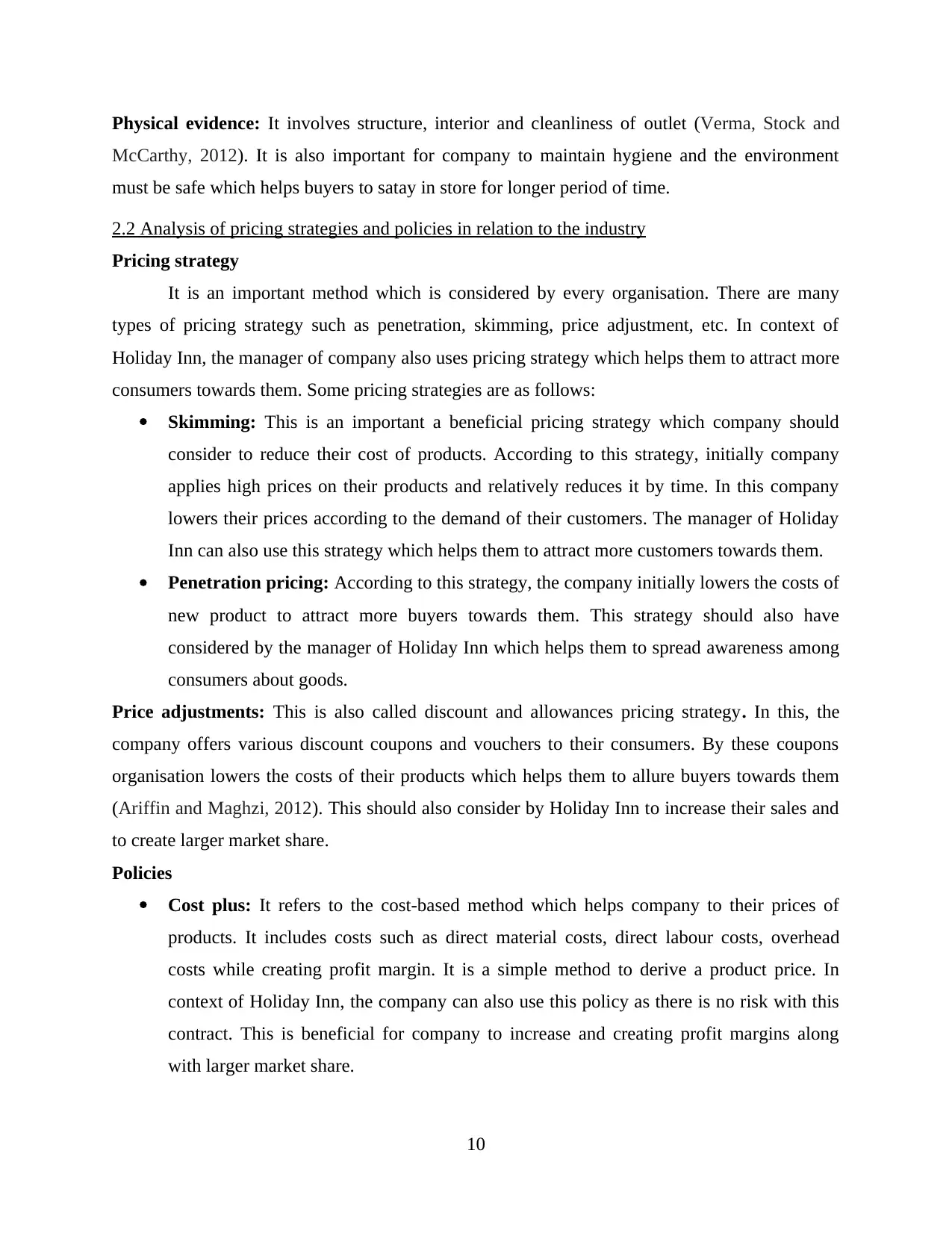
Physical evidence: It involves structure, interior and cleanliness of outlet (Verma, Stock and
McCarthy, 2012). It is also important for company to maintain hygiene and the environment
must be safe which helps buyers to satay in store for longer period of time.
2.2 Analysis of pricing strategies and policies in relation to the industry
Pricing strategy
It is an important method which is considered by every organisation. There are many
types of pricing strategy such as penetration, skimming, price adjustment, etc. In context of
Holiday Inn, the manager of company also uses pricing strategy which helps them to attract more
consumers towards them. Some pricing strategies are as follows:
Skimming: This is an important a beneficial pricing strategy which company should
consider to reduce their cost of products. According to this strategy, initially company
applies high prices on their products and relatively reduces it by time. In this company
lowers their prices according to the demand of their customers. The manager of Holiday
Inn can also use this strategy which helps them to attract more customers towards them.
Penetration pricing: According to this strategy, the company initially lowers the costs of
new product to attract more buyers towards them. This strategy should also have
considered by the manager of Holiday Inn which helps them to spread awareness among
consumers about goods.
Price adjustments: This is also called discount and allowances pricing strategy. In this, the
company offers various discount coupons and vouchers to their consumers. By these coupons
organisation lowers the costs of their products which helps them to allure buyers towards them
(Ariffin and Maghzi, 2012). This should also consider by Holiday Inn to increase their sales and
to create larger market share.
Policies
Cost plus: It refers to the cost-based method which helps company to their prices of
products. It includes costs such as direct material costs, direct labour costs, overhead
costs while creating profit margin. It is a simple method to derive a product price. In
context of Holiday Inn, the company can also use this policy as there is no risk with this
contract. This is beneficial for company to increase and creating profit margins along
with larger market share.
10
McCarthy, 2012). It is also important for company to maintain hygiene and the environment
must be safe which helps buyers to satay in store for longer period of time.
2.2 Analysis of pricing strategies and policies in relation to the industry
Pricing strategy
It is an important method which is considered by every organisation. There are many
types of pricing strategy such as penetration, skimming, price adjustment, etc. In context of
Holiday Inn, the manager of company also uses pricing strategy which helps them to attract more
consumers towards them. Some pricing strategies are as follows:
Skimming: This is an important a beneficial pricing strategy which company should
consider to reduce their cost of products. According to this strategy, initially company
applies high prices on their products and relatively reduces it by time. In this company
lowers their prices according to the demand of their customers. The manager of Holiday
Inn can also use this strategy which helps them to attract more customers towards them.
Penetration pricing: According to this strategy, the company initially lowers the costs of
new product to attract more buyers towards them. This strategy should also have
considered by the manager of Holiday Inn which helps them to spread awareness among
consumers about goods.
Price adjustments: This is also called discount and allowances pricing strategy. In this, the
company offers various discount coupons and vouchers to their consumers. By these coupons
organisation lowers the costs of their products which helps them to allure buyers towards them
(Ariffin and Maghzi, 2012). This should also consider by Holiday Inn to increase their sales and
to create larger market share.
Policies
Cost plus: It refers to the cost-based method which helps company to their prices of
products. It includes costs such as direct material costs, direct labour costs, overhead
costs while creating profit margin. It is a simple method to derive a product price. In
context of Holiday Inn, the company can also use this policy as there is no risk with this
contract. This is beneficial for company to increase and creating profit margins along
with larger market share.
10
Paraphrase This Document
Need a fresh take? Get an instant paraphrase of this document with our AI Paraphraser
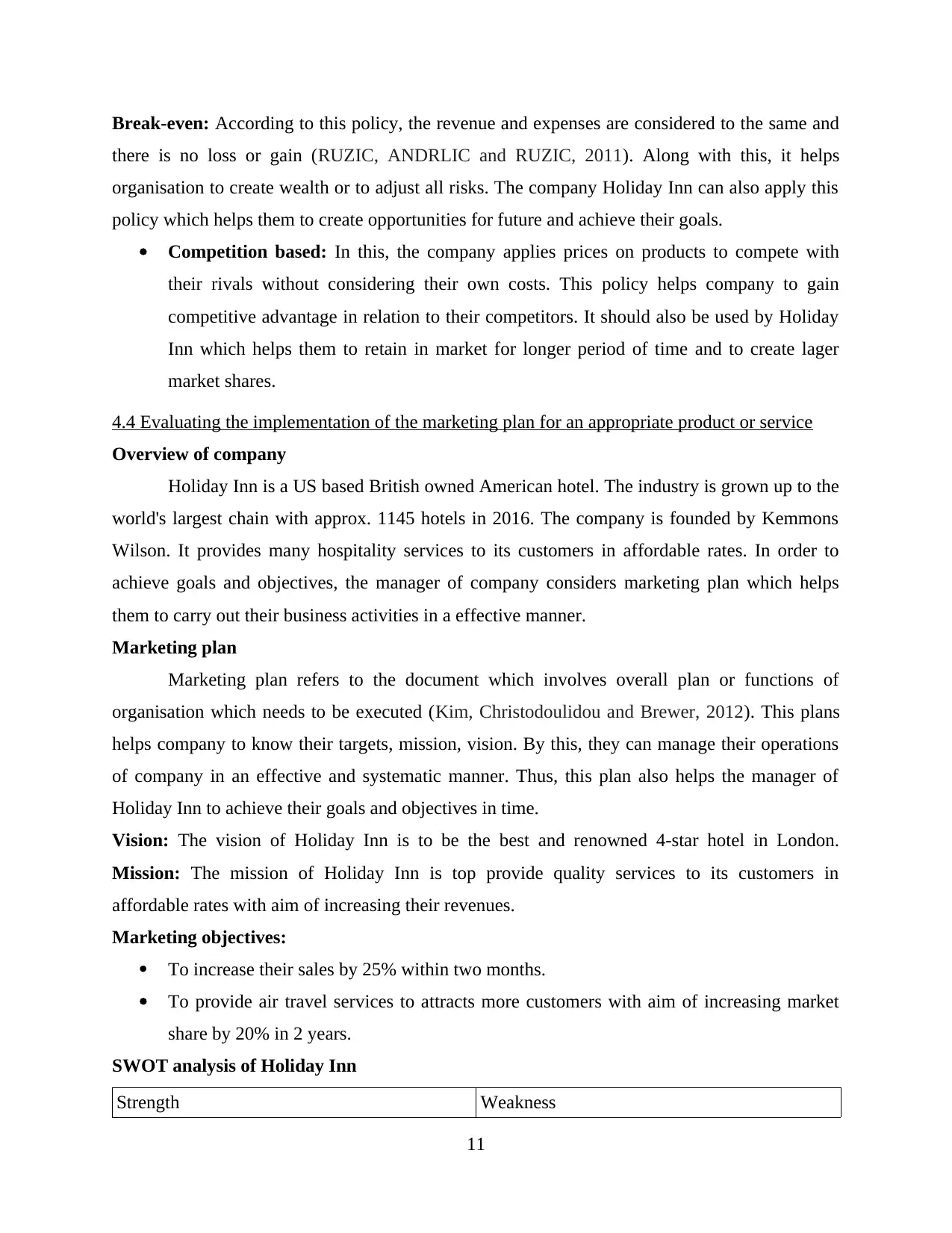
Break-even: According to this policy, the revenue and expenses are considered to the same and
there is no loss or gain (RUZIC, ANDRLIC and RUZIC, 2011). Along with this, it helps
organisation to create wealth or to adjust all risks. The company Holiday Inn can also apply this
policy which helps them to create opportunities for future and achieve their goals.
Competition based: In this, the company applies prices on products to compete with
their rivals without considering their own costs. This policy helps company to gain
competitive advantage in relation to their competitors. It should also be used by Holiday
Inn which helps them to retain in market for longer period of time and to create lager
market shares.
4.4 Evaluating the implementation of the marketing plan for an appropriate product or service
Overview of company
Holiday Inn is a US based British owned American hotel. The industry is grown up to the
world's largest chain with approx. 1145 hotels in 2016. The company is founded by Kemmons
Wilson. It provides many hospitality services to its customers in affordable rates. In order to
achieve goals and objectives, the manager of company considers marketing plan which helps
them to carry out their business activities in a effective manner.
Marketing plan
Marketing plan refers to the document which involves overall plan or functions of
organisation which needs to be executed (Kim, Christodoulidou and Brewer, 2012). This plans
helps company to know their targets, mission, vision. By this, they can manage their operations
of company in an effective and systematic manner. Thus, this plan also helps the manager of
Holiday Inn to achieve their goals and objectives in time.
Vision: The vision of Holiday Inn is to be the best and renowned 4-star hotel in London.
Mission: The mission of Holiday Inn is top provide quality services to its customers in
affordable rates with aim of increasing their revenues.
Marketing objectives:
To increase their sales by 25% within two months.
To provide air travel services to attracts more customers with aim of increasing market
share by 20% in 2 years.
SWOT analysis of Holiday Inn
Strength Weakness
11
there is no loss or gain (RUZIC, ANDRLIC and RUZIC, 2011). Along with this, it helps
organisation to create wealth or to adjust all risks. The company Holiday Inn can also apply this
policy which helps them to create opportunities for future and achieve their goals.
Competition based: In this, the company applies prices on products to compete with
their rivals without considering their own costs. This policy helps company to gain
competitive advantage in relation to their competitors. It should also be used by Holiday
Inn which helps them to retain in market for longer period of time and to create lager
market shares.
4.4 Evaluating the implementation of the marketing plan for an appropriate product or service
Overview of company
Holiday Inn is a US based British owned American hotel. The industry is grown up to the
world's largest chain with approx. 1145 hotels in 2016. The company is founded by Kemmons
Wilson. It provides many hospitality services to its customers in affordable rates. In order to
achieve goals and objectives, the manager of company considers marketing plan which helps
them to carry out their business activities in a effective manner.
Marketing plan
Marketing plan refers to the document which involves overall plan or functions of
organisation which needs to be executed (Kim, Christodoulidou and Brewer, 2012). This plans
helps company to know their targets, mission, vision. By this, they can manage their operations
of company in an effective and systematic manner. Thus, this plan also helps the manager of
Holiday Inn to achieve their goals and objectives in time.
Vision: The vision of Holiday Inn is to be the best and renowned 4-star hotel in London.
Mission: The mission of Holiday Inn is top provide quality services to its customers in
affordable rates with aim of increasing their revenues.
Marketing objectives:
To increase their sales by 25% within two months.
To provide air travel services to attracts more customers with aim of increasing market
share by 20% in 2 years.
SWOT analysis of Holiday Inn
Strength Weakness
11
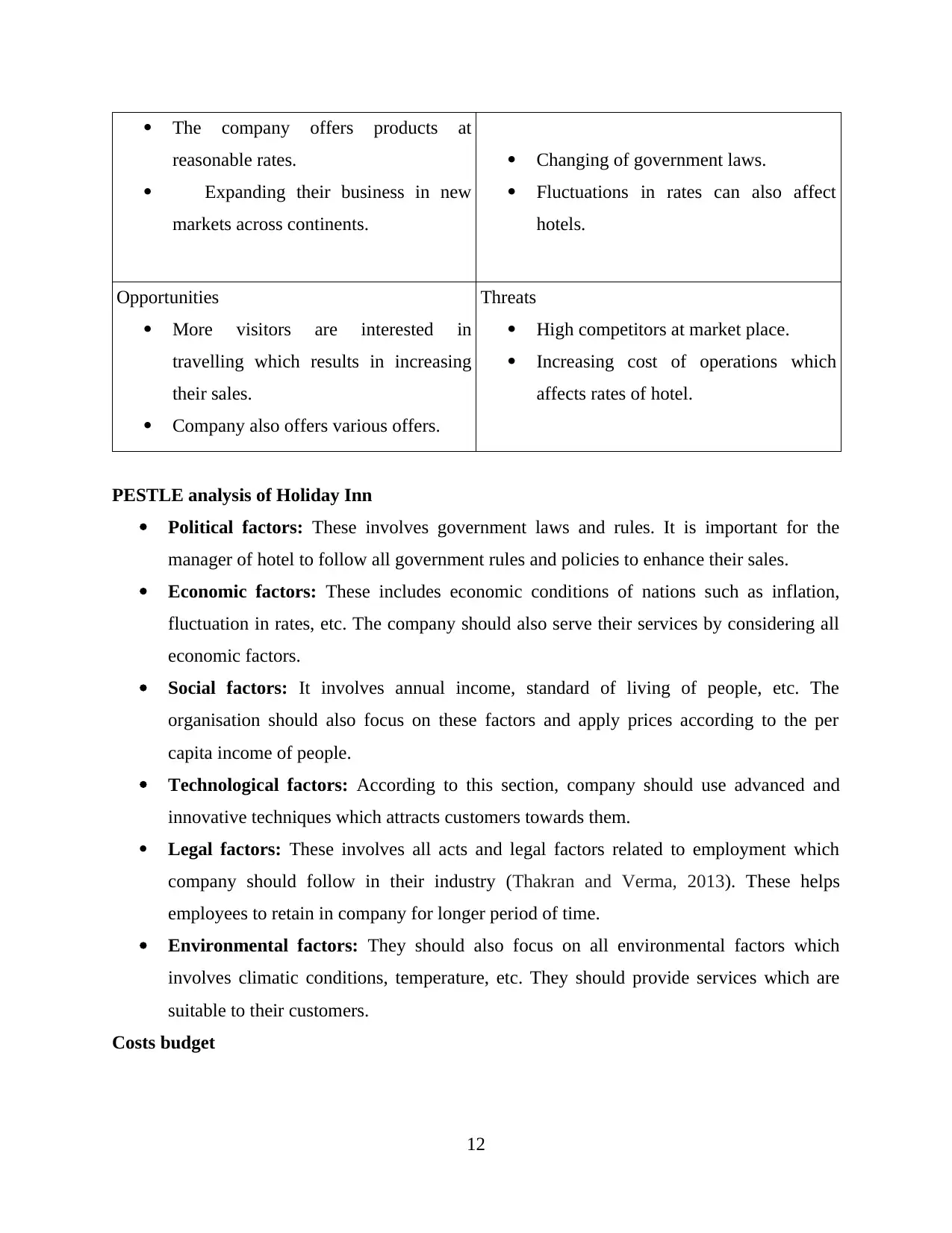
The company offers products at
reasonable rates.
Expanding their business in new
markets across continents.
Changing of government laws.
Fluctuations in rates can also affect
hotels.
Opportunities
More visitors are interested in
travelling which results in increasing
their sales.
Company also offers various offers.
Threats
High competitors at market place.
Increasing cost of operations which
affects rates of hotel.
PESTLE analysis of Holiday Inn
Political factors: These involves government laws and rules. It is important for the
manager of hotel to follow all government rules and policies to enhance their sales.
Economic factors: These includes economic conditions of nations such as inflation,
fluctuation in rates, etc. The company should also serve their services by considering all
economic factors.
Social factors: It involves annual income, standard of living of people, etc. The
organisation should also focus on these factors and apply prices according to the per
capita income of people.
Technological factors: According to this section, company should use advanced and
innovative techniques which attracts customers towards them.
Legal factors: These involves all acts and legal factors related to employment which
company should follow in their industry (Thakran and Verma, 2013). These helps
employees to retain in company for longer period of time.
Environmental factors: They should also focus on all environmental factors which
involves climatic conditions, temperature, etc. They should provide services which are
suitable to their customers.
Costs budget
12
reasonable rates.
Expanding their business in new
markets across continents.
Changing of government laws.
Fluctuations in rates can also affect
hotels.
Opportunities
More visitors are interested in
travelling which results in increasing
their sales.
Company also offers various offers.
Threats
High competitors at market place.
Increasing cost of operations which
affects rates of hotel.
PESTLE analysis of Holiday Inn
Political factors: These involves government laws and rules. It is important for the
manager of hotel to follow all government rules and policies to enhance their sales.
Economic factors: These includes economic conditions of nations such as inflation,
fluctuation in rates, etc. The company should also serve their services by considering all
economic factors.
Social factors: It involves annual income, standard of living of people, etc. The
organisation should also focus on these factors and apply prices according to the per
capita income of people.
Technological factors: According to this section, company should use advanced and
innovative techniques which attracts customers towards them.
Legal factors: These involves all acts and legal factors related to employment which
company should follow in their industry (Thakran and Verma, 2013). These helps
employees to retain in company for longer period of time.
Environmental factors: They should also focus on all environmental factors which
involves climatic conditions, temperature, etc. They should provide services which are
suitable to their customers.
Costs budget
12
⊘ This is a preview!⊘
Do you want full access?
Subscribe today to unlock all pages.

Trusted by 1+ million students worldwide
1 out of 19
Related Documents
Your All-in-One AI-Powered Toolkit for Academic Success.
+13062052269
info@desklib.com
Available 24*7 on WhatsApp / Email
![[object Object]](/_next/static/media/star-bottom.7253800d.svg)
Unlock your academic potential
Copyright © 2020–2025 A2Z Services. All Rights Reserved. Developed and managed by ZUCOL.





